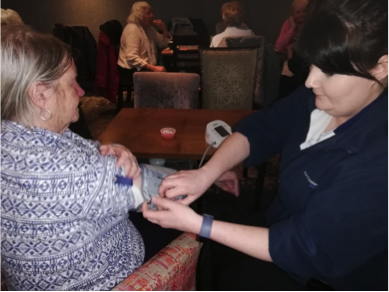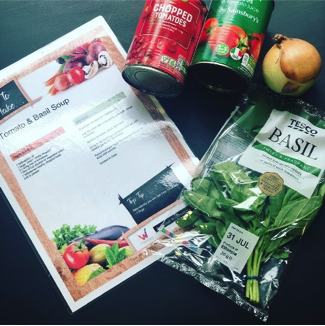Living Well: Nutrition and Hydration in Later Life
Blog post by Rachel Harding, Health Development Coordinator for Wythenshawe (Brooklands) and Northenden.
For Nutrition and Hydration Week (Monday 14 to Sunday 20 March) Wythenshawe (Brooklands) and Northenden Neighbourhood raised awareness of the importance of eating and drinking well in later life.
Since 2019 there have been many conversations in the neighbourhood about supporting older people to have healthy nutritious diets, remain hydrated and stay connected. It started with a visit to the Greater Manchester Nutrition and Hydration conference where we learnt about a two-year pilot to prevent malnutrition and dehydration across five areas of Greater Manchester. This generated lots of ideas and enthusiasm for how we could incorporate some of the successful elements of this pilot into the work we were doing in Wythenshawe.
Traditionally when we think about nutrition as a public health issue we think about obesity and poor diets, but malnutrition in older people is quite common. In fact, in the UK 3 million adults and 1 million older adults over the age of 65 years are malnourished or at risk (Bapen, 2018). In Manchester we have also 14% of people over the age of 65 unfortunately at risk of malnutrition.
Therefore, the neighbourhood partnership team wanted to:
- Improve neighbourhood knowledge and awareness of malnutrition and hydration
- Support older people to eat and drink well
- Learn how to identify individuals who may be at risk of becoming undernourished and dehydrated
- Provide practical tips to help support people who may be losing weight or not drinking enough
And to help with the above, we used Nutrition and Hydration week as an opportunity to build our knowledge and awareness, engage the community (example pictured right) and share messages about good nutrition and hydration.

We also have been supporting local organisations to improve their knowledge and use their expertise to help people recognise if they had started to lose weight without meaning to. There is now a desire for community champion training which we will hopefully role out over the coming months.
Below are just some examples of the engagement we undertook.
Wythenshawe Good Neighbours
Wythenshawe Good Neighbours welcomed us, Buzz health and wellbeing service and community Rehabilitation Service to their Tuesday Community Lunch – we talked about different ways of improving eating habits, how to reduce the risk of falling and a few ideas for alcohol free cocktails!

Carers Manchester South group
Blossom – Health through activity joined Carers Manchester South group for carers of adults with autism to share their enthusiasm for good food. The group spotlighted good nutrition and hydration with chats about food grandparents ate and everyone was happy to receive the lovely bound Wythenshawe Cook Book and will use it to keep healthy recipes nicely stored in future. The groups are now hoping to visit them in their horticulture centre in Wythenshawe Park later in the year too.

Some key facts
Did you know, if you are malnourished you are three times more likely to go into hospital. In addition, your stay is likely to be three days longer and you may take longer to recover.
We also learnt that 47% of all people who fall are malnourished and 20% of older people are dehydrated.
Our next steps
Extending Nutrition and Hydration week into our neighbourhood has started the conversation with key organisations who help older people in the community. We will continue with the development of community champions and build on the many ideas that have been shared this last six months.
How to get involved
If you would like to get involved with work or find out more information, please contact Rachel Harding, Health Development Co-ordinator – Wythenshawe (Brooklands) and Northenden.
Useful resources
Eating and Drinking Well with Dementia
A guide for Family Carers and Friends
Some useful advice from the Aging and Dementia Research Centre at Bournemouth University on how to increase food and drink intake for those living with dementia.
Community Nutrition Service recipes
- Nourishing drinks [coming soon]
- Food Fortification [PDF, 139KB]
- 100 Calorie Boosters [PDF, 954KB]
- Super Shakes [PDF, 160KB]
Nutrition and hydration station posters
The Nutrition and Hydration Week website hosts posters nutrition and hydration station posters with you can display within your premises.
Age UK
Age UK have a variety of information available on their website for people aged 65 years and over. This includes:
- Hydration tips and weight loss signs A5 leaflets
- Nutrition and Hydration during Covid 19 briefing (to print)
- Shopping for a friend or relative (to print)
- Staple cupboard recipe booklet
In addition, they also have information for people at higher risk of malnutrition including:
- Eat, Drink, Live Well booklet
- Paperweight armband
- Food first recipes
Advice and support for individuals with poor appetites
Some useful advice on how to support individuals with poor appetites from the British Nutrition Foundation.
Alzheimer’s Society
The Alzheimer’s Society website has a wide range of products designed to support people with dementia with eating and drinking. They can support independence and wellbeing.
Mocktail postcard
To request mocktail postcard copy, email Rachel Harding.
